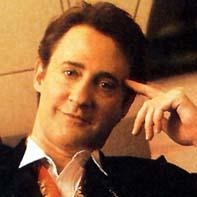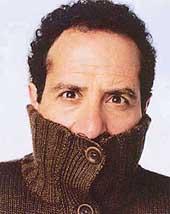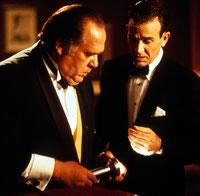It kind of has to. The whole point of TV is to keep people watching and while the people in my college gasp in horror over such crass comsumerism, it's a respectable motivation. People who are bored don't watch. People who aren't being diverted don't watch. Not being bored and being diverted seems a fairly good definition of entertainment to me.
In the first season, and sometimes the second, this means that the writers pull out all the stops. They give you every single burning building, trapped in another dimension, time wrapping, wrongfully accused, meet up with old friend/lover/villain, identity theft variation-on-a-theme plot line that is out there.
Which leaves one going, "Uh, what about season three?"
What happens in season three is that plotlines based on the characters take over. This doesn't work in season one because the audience does not yet care whether Bobby's wife leaves him or Judy's husband is a drug addict or Samantha really, really wants a child. But by season two, the viewer has become invested in the characters' welfare. From the writer's perspective, this means they can put the character in danger and voila! that's enough to keep the tension going. (This is how soaps work.)
Star Trek: Next Generation, bizarrely enough, started doing this early on. I've been rewatching the DVDs sort of in order. I started renting season 2 (Netflix) and getting season 1 out of the library. What surprised me was that despite the totally hokey plots of season 1, they were far more action packed than
 the season 2 episodes I've watched so far. Season 2 is surprisingly talky and personality-centered. Since many times this involves watching Brent Spiner do comedy, I don't mind especially. (That's him in the picture.) And I think this early focus might explain Star Trek: Next Gen's popularity. Sci-fi, by necessity, has to focus on plot, and, like cop shows, it's kind of okay to do the same story over and over and over. They meet aliens! Someone dies! Whatever, it's the same story. But you can't churn out seven seasons without creating some attachment to the characters and eventually attachment to characters is what keeps a show going.
the season 2 episodes I've watched so far. Season 2 is surprisingly talky and personality-centered. Since many times this involves watching Brent Spiner do comedy, I don't mind especially. (That's him in the picture.) And I think this early focus might explain Star Trek: Next Gen's popularity. Sci-fi, by necessity, has to focus on plot, and, like cop shows, it's kind of okay to do the same story over and over and over. They meet aliens! Someone dies! Whatever, it's the same story. But you can't churn out seven seasons without creating some attachment to the characters and eventually attachment to characters is what keeps a show going. Take the final seasons of Buffy, for instance. Shows like the dream episode simply wouldn't have worked earlier on. Even "Band Candy" (season 3) wouldn't have worked in season 1 since part of the great joy of "Band Candy" is watching Giles, who we already know very well, acting like a hulking, belligerent teenager (and he does it magnificently; that's his real accent, by the way). The latter half of Mash was more about Hawkeye and crew than the Korean War or medicine.
The only problem with this people-intense approach is that plot is ultimately what runs the machine. Mash faltered and died (especially with the loss of Radar). It all comes down to story, really. Yes, there are shows like 7th Heaven and One Tree Hill and such that run basically on "what will happen next to so and so" (and I'd like to add here, in a random tangent, that there are few things that bug me as much as that manipulative mother on 7th Heaven; I like the actress; but I can't stand her Camden character). But story is still the power source. CSI, Law & Order, Star Trek, all those shows are aggressively popular because they deliver a story. Even reality shows are cut and pasted until some kind of plot emerges. (This week, Gary and Vanessa fight over food rationing!) Once all the stories have been used up, people are all that is left.
So,I don’t blame the writers for switching focus. They're just trying to make a living, and hey, I can always change channels. And sometimes it works.
 Take Monk, for instance. There are only so many detective plots out there, and there are only so many "what crazy thing is Monk doing today" ideas; to cope, the writers have focused more and more on using the marvelous comedic powers of Tony Shalhoub and Ted Levine. The second episode of season 3 is one of the funniest episodes of Monk I've seen. I keep thinking, "They can't top that," and then they do. (When Monk thinks he is locked in the panic room and Ted Levine is shouting instructions to him through the hole in the door is one of the dumbest funny things I've seen. Who would have thunk? Oh, yes, and the monkey. The monkey is great.)
Take Monk, for instance. There are only so many detective plots out there, and there are only so many "what crazy thing is Monk doing today" ideas; to cope, the writers have focused more and more on using the marvelous comedic powers of Tony Shalhoub and Ted Levine. The second episode of season 3 is one of the funniest episodes of Monk I've seen. I keep thinking, "They can't top that," and then they do. (When Monk thinks he is locked in the panic room and Ted Levine is shouting instructions to him through the hole in the door is one of the dumbest funny things I've seen. Who would have thunk? Oh, yes, and the monkey. The monkey is great.) Star Trek developed the Borg (getting one villain and keeping it is always a good idea). CSI: Las Vegas split their team up which I'm not sure worked, but it made for an effective near last line of the last episode. (Lot of work for one line, but hey....) Whedon's coping mechanism is usually to keep adding more and more and more characters, which doesn't really work, but it keeps things interesting. (Although I thought the last two seasons of Buffy and Angel were both pretty bad; Whedon-bad which means they were still rocking, but not so hot compared to the earlier seasons.) NCIS actually killed someone off. Which I didn't see coming, even though the TV ads told me it would happen, and it shocked me to my core. (But is she really dead?) So next season, the characters can HANDLE THEIR GRIEF, etc. etc. for twenty trillon episodes.
In general, I prefer plot & story to character development, but I do like to like the characters, at least. I could never get into Enterprise because, despite liking Scott Bakula, I didn't much care for any character except Trapp. But I like all the Star Trek: Next Gen characters,
 even Troi despite her silly lines. I adore Nero Wolfe (season 2 is coming out; it's coming out!) characters, which is a good thing since sometimes those plots are totally convoluted. The dialog between Wolfe and Archie goes a long way towards making the show work. I prefer CSI: Las Vegas to the others, mostly because I like the supporting characters; that is, I like Grissom and Caruso (lovely voice that guy has got) and Sinise but I don't much care for the supporting characters on Miami and New York. But I really like Warwick, Nick, Sarah (even Sarah, who is a basket case if ever I saw one) and Katherine and Greg, of course. Even Hodges and Eckley, who may be a bureaucrat but was right about Grissom screwing up as a manager.
even Troi despite her silly lines. I adore Nero Wolfe (season 2 is coming out; it's coming out!) characters, which is a good thing since sometimes those plots are totally convoluted. The dialog between Wolfe and Archie goes a long way towards making the show work. I prefer CSI: Las Vegas to the others, mostly because I like the supporting characters; that is, I like Grissom and Caruso (lovely voice that guy has got) and Sinise but I don't much care for the supporting characters on Miami and New York. But I really like Warwick, Nick, Sarah (even Sarah, who is a basket case if ever I saw one) and Katherine and Greg, of course. Even Hodges and Eckley, who may be a bureaucrat but was right about Grissom screwing up as a manager. So character does matter. But it can't carry plot forever. Even on a good day.
P.S. Plot and story are somewhat different things, but that's another post for another day.

2 comments:
The problem with MASH and other shows isn't that they became character driven, but that the characters all became chums. All the conflict, then, became external and increasingly artificial. This is what happened with both Buffy and Angel. (In the end, what saved Angel was Spike. Had Angel and Spike become chums, the show would have been over.)
I would agree that chumminess will kill a show pretty quickly. (I guess, if I wanted to keep my post argument neat and dovetailed, I would argue that the less and less the writers have to write about, as they use up plot ideas, the more and more they fall back on personality to deliver.)
The problem with chumminess is that too much nastiness can be a turn off I can't watch Raymond for this reason, but then Raymond is very popular so what do I know?! Of course, a certain level of chumminess is forced simply by the characters living in TV land. In real life, ex-girlfriends and ex-boyfriends just don't spend that much time together.
Post a Comment